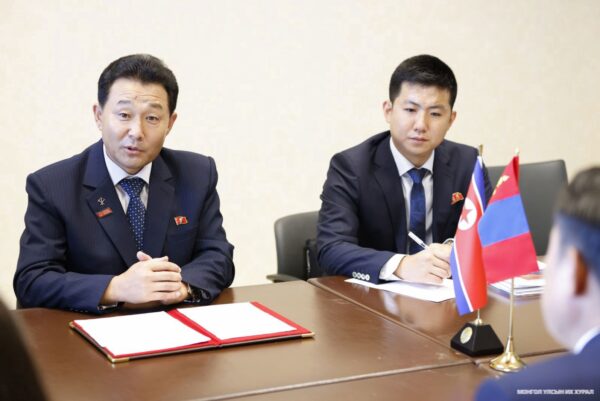Meeting between Amarbayasgalan Dashzegve, chairman of the State Great Hural of Mongolia, and Pak In Chol, president of the North Korean Supreme People’s Assembly, July 31, 2025.
In the intricate geopolitical web of Northeast Asia, Mongolia has long clung to its identity as a “neutral bridge,” leveraging its “Third Neighbor Policy” to carve out autonomy amid the overlapping influence of China and Russia. What began in the 1990s as an expedient to reduce economic dependence on Beijing and Moscow has evolved into a values-based diplomatic stance, earning Ulaanbaatar credibility as a nonaligned mediator.
Yet between 2024 and 2025, three converging crises shattered this delicate balance: the collapse of the soft power narrative embodied by the Mongolia-South Korea co-produced film ”On the Way to the South,” the exposure of a South Korean spy scandal, and a diplomatic crisis sparked by the defection of a North Korean interpreter.
Together, these incidents laid bare a sharp contradiction at the heart of Mongolia’s neutrality: how to reconcile humanitarian idealism with economic pragmatism, and how to safeguard national sovereignty while appeasing both Seoul and Pyongyang. Coming in 2025 – the 35th anniversary of Mongolia-South Korea diplomatic ties – and on the heels of Ulaanbaatar’s renewed engagement with Pyongyang in 2024, the crisis has become a defining test of Mongolia’s diplomatic maturity.
Soft Power Ambitions Collide with Sovereign Compromises
Premiering in Ulaanbaatar in September 2024 and Seoul in April 2025, ”On the Way to the South” was intended to consolidate both countries’ soft power. Co-directed by South Korea’s Sangrae Kim and Mongolia’s Battulga Suvid, the film eschewed political grandstanding for a human-centric narrative: a North Korean mother fleeing border patrols with her child, a Mongolian border guard torn between duty and compassion, and a defector grappling with separation trauma. Starring prominent Mongolian actors Sarantuya Sambuu, Erkhembayar Ganbold, Samdanpurev Oyunsambuu, and Zamilan Bold-Erdene alongside South Korean stars Park Kwang-hyun, Oh Su-jung, and Choi Jun-yong, the film deliberately framed Mongolia as a “moral mediator” – rejecting Seoul’s hardline stance toward Pyongyang while disavowing North Korea’s isolationist policies.
The film’s release was meticulously timed to coincide with the 2025 bilateral anniversary, aiming to enhance Mongolia’s voice in Korean Peninsula mediation while aligning with South Korea’s “New Northern Policy,” which positions Mongolia as a Eurasian resource hub. Domestically, it stoked national pride in a small nation contributing to regional stability; internationally, it successfully rebranded the Third Neighbor Policy from a mere economic diversification strategy to a diplomatic framework rooted in humanitarian values. This narrative resonated because Mongolia remains one of the few countries to maintain stable long-term rel
Continue Reading on The Diplomat
This preview shows approximately 15% of the article. Read the full story on the publisher's website to support quality journalism.
